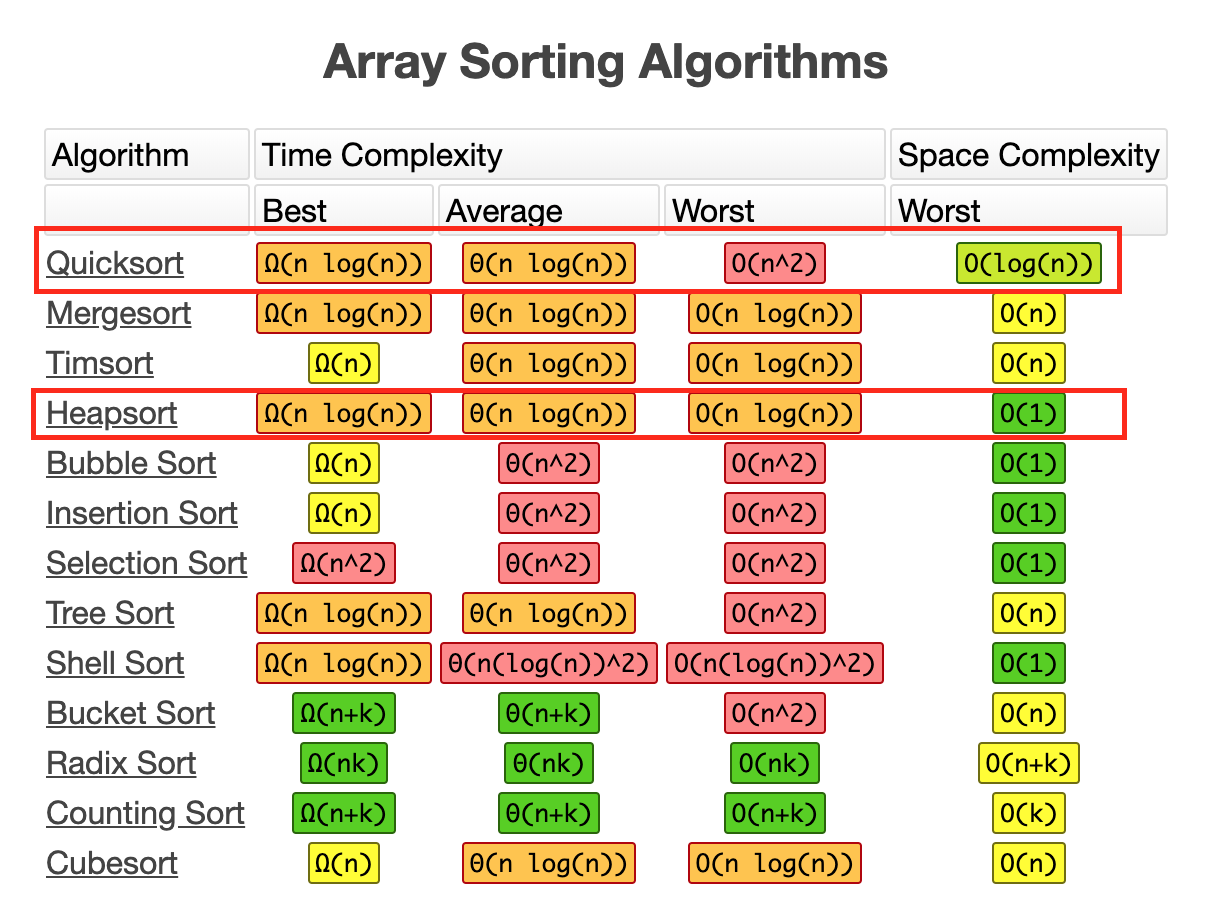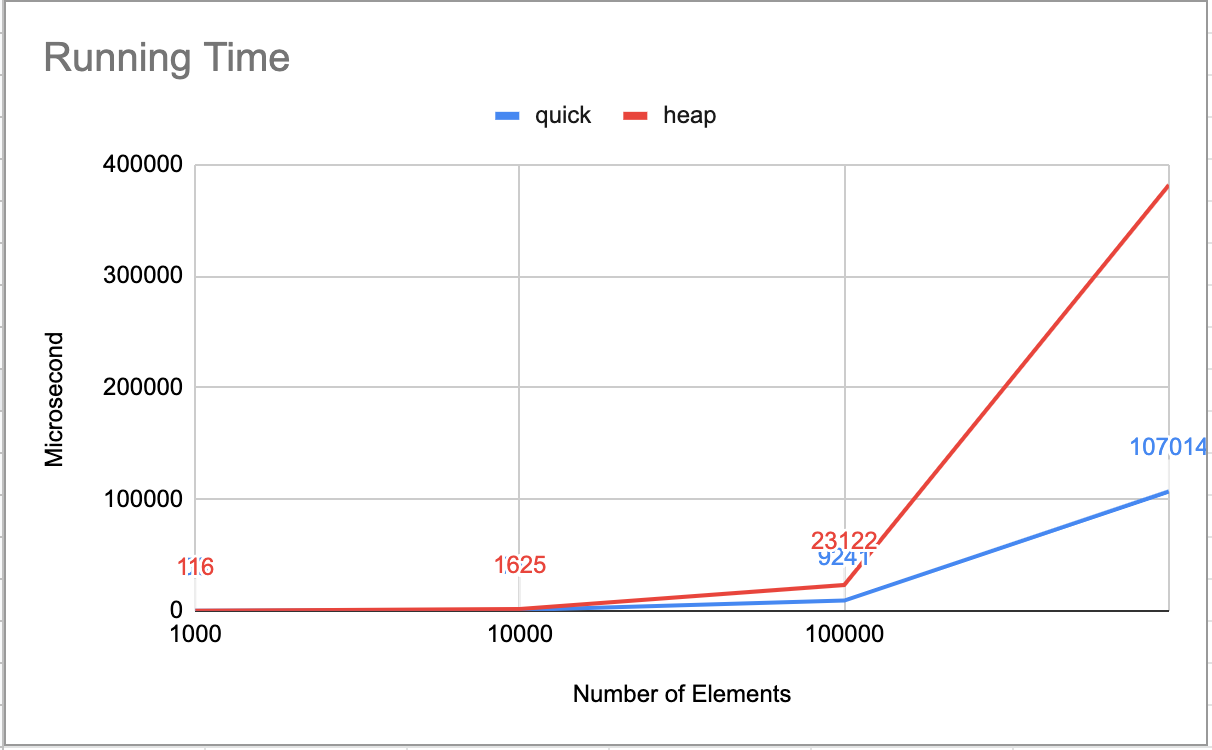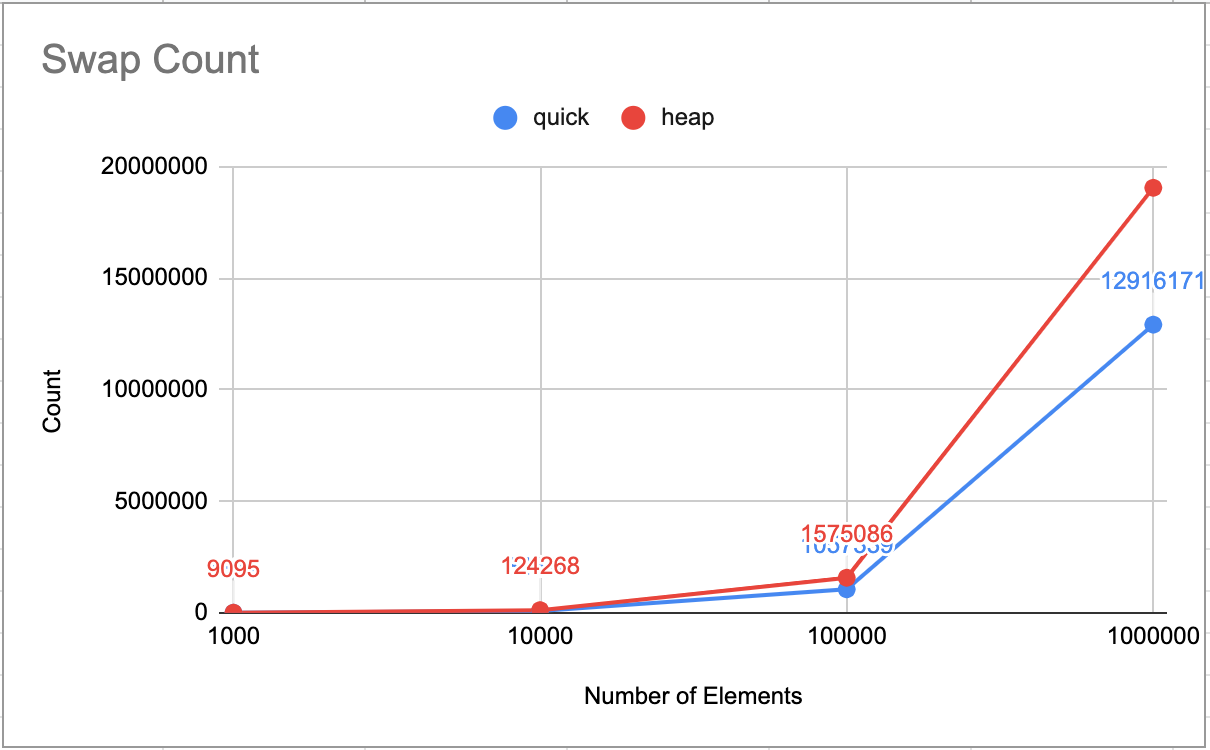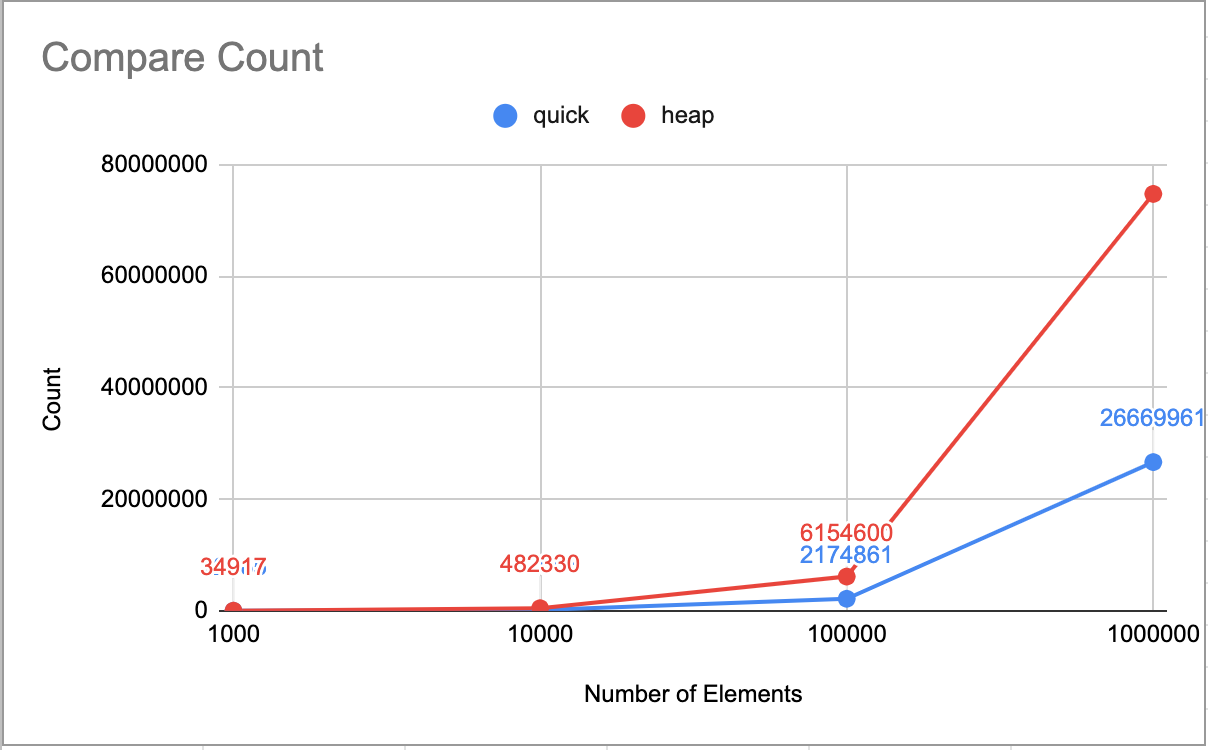Why Quick Sort Is Faster than Heap Sort?
Why Quick Sort?
I was reviewing sorting algorithm for my interview. The question just popped up in my mind when I was peeking the cheat sheet.
 [1]
[1]
You can see the best, average and worst time complexity of heap sort are all O(n logn) but it’s O(n^2) for worst of quick sort.
Then why do we always use quick sort? Since quick sort can’t beat heap sort in any cases, not even in space complexity.
I don’t see any advantages of choosing quick sort.
Time Complexity
Let’s review time complexity. Here is the definition from Wikipedia [2]:
In computer science, the time complexity is the computational complexity that describes the amount of time it takes to run an algorithm. Time complexity is commonly estimated by counting the number of elementary operations performed by the algorithm, supposing that each elementary operation takes a fixed amount of time to perform. Thus, the amount of time taken and the number of elementary operations performed by the algorithm are taken to differ by at most a constant factor.
I’d like to focus on this sentence: supposing that each elementary operation takes a fixed amount of time to perform.
That means we do actually ignore the real world running time. It’s okay to do this since time complexity is used to describe the growth rate between an algorithm and it’s input size.
Let’s take a look at another thing: constant time [3]:
An algorithm is said to be constant time (also written as O(1) time) if the value of T(n) is bounded by a value that does not depend on the size of the input. Despite the name “constant time”, the running time does not have to be independent of the problem size, but an upper bound for the running time has to be bounded independently of the problem size. For example, the task “exchange the values of a and b if necessary so that a≤b” is called constant time even though the time may depend on whether or not it is already true that a ≤ b. However, there is some constant t such that the time required is always at most t.
Now, we should focos on this one: despite the name "constant time", the running time does not have to be independent of the problem size, but an upper bound for the running time has to be bounded independently of the problem size.
For example, take a look at the code below:
func sum(num []int) int {
count := 0
for _, v := range num {
count += v
}
for i := 0; i < 1000; i++ {
for j := 0; j < 1000; j++ {
fmt.Println("constant operation here!")
}
}
return count
}What’s the time complexity you would say about this piece of code? O(n)? O(n^2)? (where n is the size of slice num)
We all know the time complexity is O(n) though there is a nested loop which runs a million times.
Why we can just drop the nested loop here? No matter how we change the size of input, the running time of the nested loop is all the same. That is, an upper bound for the running time has to be bounded independently.
Non-negligible Constant
I wrote quick sort and heap sort and here is the code:
Quick sort:
func quickSort(numbers []int, left, right int, c *Comparer) {
if c.lessEqual(right, left) {
return
}
pivot := numbers[left]
i := left
for j := left + 1; j <= right; j++ {
if c.less(numbers[j], pivot) {
i++
c.swap(numbers, i, j)
}
}
c.swap(numbers, i, left)
quickSort(numbers, left, i-1, c)
quickSort(numbers, i+1, right, c)
}Heap sort:
func heapSort(heap []int, c *Comparer) {
end := len(heap) - 1
// build max heap
for i := len(heap) / 2; i >= 0; i-- {
heapify(heap, i, end, c)
}
// sort heap
for i := end; i > 0; i-- {
c.swap(heap, 0, i)
heapify(heap, 0, i-1, c)
}
}
func heapify(heap []int, i, end int, c *Comparer) {
left := 2*i + 1
if c.less(end, left) {
return
}
target := left
right := left + 1
if c.lessEqual(right, end) && c.less(heap[left], heap[right]) {
target = right
}
if c.less(heap[target], heap[i]) {
return
}
c.swap(heap, i, target)
heapify(heap, target, end, c)
}Let’s run it and record the running time (I ran it 10 times for each size of input and average it).
Here is the result:

Actual number (first row represents the input size):
Running time (in microsecond)
# 1000 10000 100000 1000000
Quick 65 680 9178 104027
Heap 138 1652 21579 357418
You can see that quick sort is 2-3 times faster than heap sort.
Why this happens?
Sorting algorithm basically does two things: comparison and swapping. Let’s dig more from it.
You may have noticed there is a strange struct Comparer in the code above. I built this for counting the number of swapping and comparison.
func (c *Comparer) less(i, j int) bool {
c.compareCount++
if i < j {
return true
}
return false
}
func (c *Comparer) lessEqual(i, j int) bool {
c.compareCount++
if i <= j {
return true
}
return false
}
func (c *Comparer) swap(numbers []int, i, j int) {
c.swapCount++
numbers[i], numbers[j] = numbers[j], numbers[i]
}Now let’s see the result:
Swapping:

Acutal number:
Swap
# 1000 10000 100000 1000000
Quick 6121 84340 1059759 12768393
Heap 9081 124193 1574975 19047943
Comparison:

Actual number:
Comparison
# 1000 10000 100000 1000000
Quick 12054 171241 2171008 26372074
Heap 34868 482183 6154440 74738690
The numbers swapping and comparison of quick sort are far less than heap sort.
I think there are two reasons for this.
First, when we talk about time complexity, we actually talk about the input size and it’s running time. More precisely, the growth rate of running time and input size. We just drop all “fixed” operation.
Second, as I mention above, time complexity supposes every elementary operation takes a fixed amount of time and I reckon that swapping takes more time than comparison.
Besides these two reasons, we can even consider hardware level things such as memory locality or CPU cache line.
In other words, heap sort does too many useless swapping. Heap sort swaps elements for only maintaining “heap” structure. On the other hand, quick sort swaps elements for finding which one is greater or less than pivot and somehow this is really doing “sorting”.
Conclusion
Time complexity is a way to describe how running time of an algorithm grows. Though the input size is the dominant factor, we still have to keep an eye on those “non-negligible” constant.
This page[4] lists what sorting algorithm of a language uses. Most of them are hybrid algorithm for generality.
Reference
- [1] https://www.bigocheatsheet.com/
- [2] https://en.wikipedia.org/wiki/Time_complexity
- [3] https://en.wikipedia.org/wiki/Time_complexity#Constant_time
- [4] https://www.geeksforgeeks.org/know-sorting-algorithm-set-1-sorting-weapons-used-programming-languages/
- https://stackoverflow.com/questions/2467751/quicksort-vs-heapsort
- https://stackoverflow.com/questions/1853208/quicksort-superiority-over-heap-sort
- https://web.archive.org/web/20130801175915/http://www.cs.auckland.ac.nz/~jmor159/PLDS210/qsort3.html
- https://medium.com/@k2u4yt/quicksort-vs-heapsort-3b6dc5395083
Appendix
package main
import (
"fmt"
"math/rand"
"reflect"
"time"
)
type Comparer struct {
swapCount int
compareCount int
}
func (c *Comparer) less(i, j int) bool {
c.compareCount++
if i < j {
return true
}
return false
}
func (c *Comparer) lessEqual(i, j int) bool {
c.compareCount++
if i <= j {
return true
}
return false
}
func (c *Comparer) swap(numbers []int, i, j int) {
c.swapCount++
numbers[i], numbers[j] = numbers[j], numbers[i]
}
func getRandomSlice(n int) []int {
source := rand.NewSource(time.Now().UnixNano())
r := rand.New(source)
s := make([]int, n)
for i := range s {
s[i] = r.Intn(n)
}
return s
}
func heapify(heap []int, i, end int, c *Comparer) {
left := 2*i + 1
if c.less(end, left) {
return
}
target := left
right := left + 1
if c.lessEqual(right, end) && c.less(heap[left], heap[right]) {
target = right
}
if c.less(heap[target], heap[i]) {
return
}
c.swap(heap, i, target)
heapify(heap, target, end, c)
}
func heapSort(heap []int, c *Comparer) {
end := len(heap) - 1
// build max heap
for i := len(heap) / 2; i >= 0; i-- {
heapify(heap, i, end, c)
}
// sort heap
for i := end; i > 0; i-- {
c.swap(heap, 0, i)
heapify(heap, 0, i-1, c)
}
}
func quickSort(numbers []int, left, right int, c *Comparer) {
if c.lessEqual(right, left) {
return
}
pivot := numbers[left]
i := left
for j := left + 1; j <= right; j++ {
if c.less(numbers[j], pivot) {
i++
c.swap(numbers, i, j)
}
}
c.swap(numbers, i, left)
quickSort(numbers, left, i-1, c)
quickSort(numbers, i+1, right, c)
}
func benchmark(n int) (*Comparer, *Comparer, time.Duration, time.Duration) {
var start time.Time
s := getRandomSlice(n)
qComparer := &Comparer{}
quickSlice := make([]int, len(s))
copy(quickSlice, s)
start = time.Now()
quickSort(quickSlice, 0, len(quickSlice)-1, qComparer)
quickTime := time.Since(start)
hComparer := &Comparer{}
heapSlice := make([]int, len(s))
copy(heapSlice, s)
start = time.Now()
heapSort(heapSlice, hComparer)
heapTime := time.Since(start)
return qComparer, hComparer, quickTime, heapTime
}
func printLine(title string, list interface{}) {
v := reflect.ValueOf(list)
fmt.Printf("%v\t", title)
for i := 0; i < v.Len()-1; i++ {
fmt.Printf("%v\t", v.Index(i))
}
fmt.Printf("%v\n", v.Index(v.Len()-1))
}
func main() {
test := []int{1000, 10000, 100000, 1000000}
quickSwapCount := make([]int, len(test))
quickCompareCount := make([]int, len(test))
quickTime := make([]int64, len(test))
heapSwapCount := make([]int, len(test))
heapCompareCount := make([]int, len(test))
heapTime := make([]int64, len(test))
for j, t := range test {
qs, qc, hs, hc := 0, 0, 0, 0
var qt, ht time.Duration
for i := 0; i < 10; i++ {
q, h, qTime, hTime := benchmark(t)
qs += q.swapCount
qc += q.compareCount
qt += qTime
hs += h.swapCount
hc += h.compareCount
ht += hTime
}
quickSwapCount[j] = qs / 10
quickCompareCount[j] = qc / 10
quickTime[j] = qt.Microseconds() / 10
heapSwapCount[j] = hs / 10
heapCompareCount[j] = hc / 10
heapTime[j] = ht.Microseconds() / 10
}
fmt.Println("Swap")
printLine("#", test)
printLine("Quick", quickSwapCount)
printLine("Heap", heapSwapCount)
fmt.Println()
fmt.Println("Comparison")
printLine("#", test)
printLine("Quick", quickCompareCount)
printLine("Heap", heapCompareCount)
fmt.Println()
fmt.Println("Running time")
printLine("#", test)
printLine("Quick", quickTime)
printLine("Heap", heapTime)
}